Students can access the CBSE Sample Papers for Class 12 Accountancy with Solutions and marking scheme Term 2 Set 1 will help students in understanding the difficulty level of the exam.
CBSE Sample Papers for Class 12 Accountancy Standard Term 2 Set 1 with Solutions
Time Allowed: 2 Hours
Maximum Marks: 40
General Instructions:
- This question paper comprises two Parts – A and B. There are 12 questions in the question paper. Alt1 questions are compulsory.
- Part-A is compulsory for alL candidates.
- Part-B has two options i.e., (i) Analysis of Financial Statements and (ii) Computerized Accounting. Students must attempt only one. of the given options.
- There is no overall choice. However, an internal choice has been provided in 3 questions of three marks and 1 question of five marks.
PART-A
(Accounting for Not-for-Profit Organisations, Partnership Firms, and Companies)
Question 1.
Following information has been provided by M/s Achyut Health Care.
You are required to calculate the amount of medicines consumed during the year 2020-21:
| Particulars | Amount (₹) |
| Stock of medicines as on April 1, 2020 Creditors for medicines as on April 1, 2020 Stock of medicines as on March 31,2021 Creditors for medicines as on March 31, 2021 Cash purchases of medicines during the year 2020-21 Credit purchases of medicines during the year 2020-21 |
15,00,000 3,50,000 10,00,000 4,20,000 2,00,000 6,00,000 |
(2)
Answer:
Amount of medicines consumed during the year 2020 – 21:
| Particulars | Amount (₹) |
| Cash Purchases of Medicines Add: Credit Purchases of Medicines Total Purchases Add Opening Stock Less: Closing Stock Medicines consumed during the year |
2,00,000 6,00,000 8,00,000 15,00,000 10,00.000 13,00,000 |

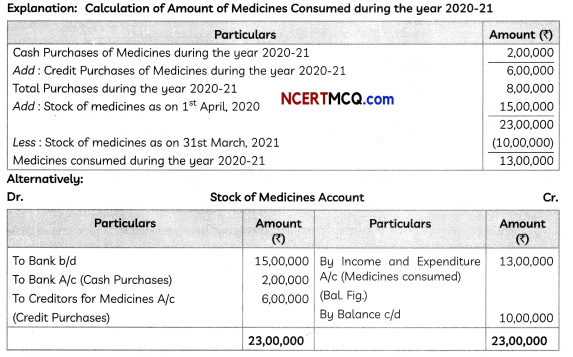
Question 2.
Distinguish between ‘Dissolution of Partnership’ and ‘Dissolution of Partnership Firm’ based on:
(A) Settlement of assets and LiabiLities
(B) Economic relationship (2)
Answer:
| Basis of Difference | Dissolution of Partnership | Dissolution of Partnership Firm |
| Settlement of Assets and Liabilities | At the time of dissolution of partnership, assets are revalued and Liabilities ore reassessed. | At the time of dissolution of partnership firm, assets are sola and liabilities are paid off. |
| Economic Relationship | Economic relationship changes between or amount the partners. | Economic relationship between or among the partners comes to an end. |
Explanation: Difference between dissolution of Partnership and Dissolution of Partnership Firm:
| Basis of Difference | Dissolution of Partnership | Dissolution of Partnership Firm |
| (A) Settlement of Assets and Liabilities | At the time of dissolution of partnership, assets are revalued and liabilities are reassessed. | At the time of dissolution of partnership firm, assets are sold and liabilities are paid off. |
| (B) Economic Relationship | Economic relationship changes between or among the partners. | Economic relationship between or among the partners comes to an end. |
Question 3.
Suresh, Ramesh and Tushar were partners of a firm sharing profit in the ratio of 6:5:4. Ramesh retired and his capital after making adjustments on account of reserves, revaluation of assets and reassessment of liabilities stood at ₹ 2,50,400.
Suresh and Tushar agreed to pay him ₹ 2,90,000 in full settlement of his claim. Pass necessary journal entry for the treatment of goodwill. Show workings clearly. (2)
Answer:

Working Note:
Ramesh’s share of Goodwill = ₹ 2,90,000 – ₹ 2,50,400 = ₹ 39,600

Working Notes:
(1) Old Profit Sharing Ratio of Suresh, Ramesh and Tushar = 6:5:4.
New Profit Sharing Ratio and Gaining Ratio of Suresh and Tushar will be 6 : 4 or 3 : 2, as no information is provided for future profit-sharing ratio between Suresh and Tushar.
2. Calculation of Ramesh’s Share of Goodwill:
Ramesh’s Share of Goodwill = Amount Paid – Ramesh’s Capital after Adjustments
= ₹ 2,90,000 – ₹ 2,50,400 = ₹ 39,600
which will be compensated by Suresh and Tushar in their Gaining Ratio, i.e., 3 : 2.
Suresh will compensate = ₹ 39,600 x \(\frac{3}{5}\)
= ₹ 23,760
Tushar will compensate = ₹ 39,600 x \(\frac{2}{5}\)
= ₹ 15,840
Question 4.
From the following information given by Modern Dance Academy, calculate the amount of Subscription received during the year 2020-21.
(i) Subscription credited to Income & Expenditure A/c for the year ending 31st March 2021 amounted to ₹ 3,00,000 and each member is required to pay an annual subscription of ₹ 3,000.
(ii) Subscription in arrears as on 1st April 2020 amounted to ₹ 16,000.
(iii) During the year 2020-21,10 members made partial payment of ₹ 26,000 towards subscription, 8 members failed to pay the subscription amount and 5 members paid the subscription amount for the year 2021-22.
(iv) During the year 2019-20,12 members paid the subscription amount for the year 2020-21.
OR
Following information is given by Alchemy Medical College, Library department for the year 2020-21.
| Particulars | Amount (₹) |
| Books and Journals Fund as on 1.4.2020 7% Books and Journals Fund Investments as on 1.4.2020 Interest on Books and Journals Fund Investments Donations for Books and Journals Books Purchased General Fund as on 1.4.2020 |
4,50,000 4,00,000 13,000 20,000 70,000 10,00,000 |
Show the accounting treatment of the above-mentioned items in the Balance Sheet of the Alchemy Medical College as at 31st March 2021.(3)
Answer:
Calculation of amount of Subscription received during the year 2020-21
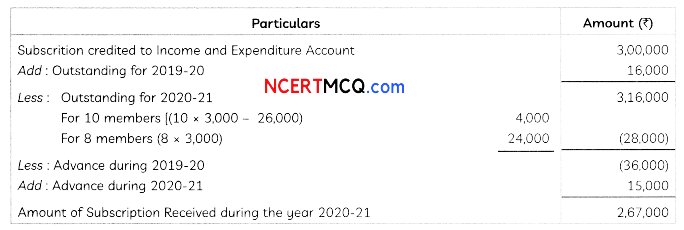
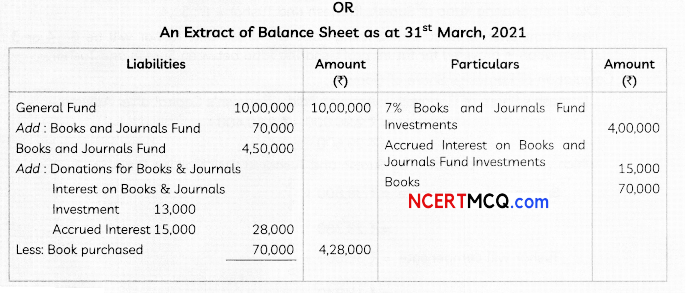
Working Note:
Interest on Books and JournaLs Investments = 4,00.000 x \(\frac{7}{100}\) = 28,000
Accrued Interest 28,000 – 13,000 = 15.000
Explanation: Calculation of Amount of Subscription received during the year 2020-21
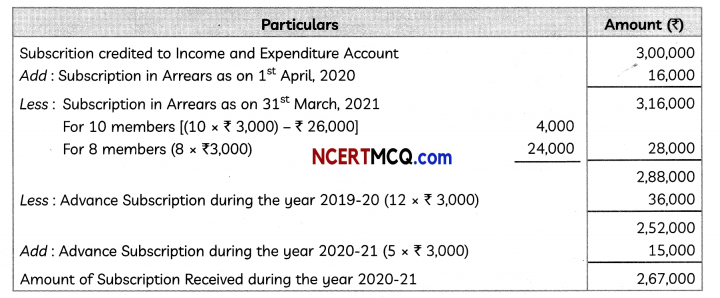
OR
In the books of Alchemy Medical College Balance Sheet (An Extract) as at 31st March, 2021
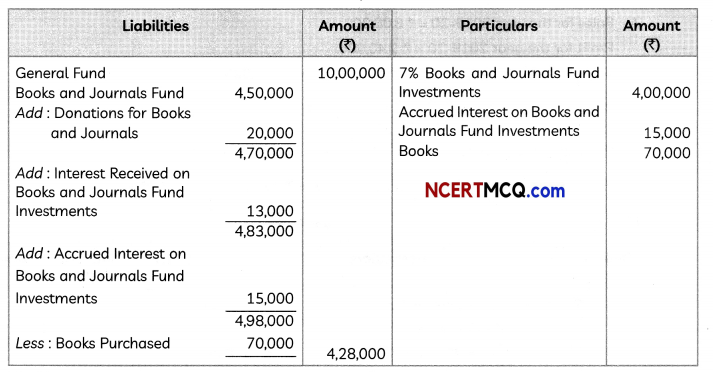
Working Note:
Interest on Books and JournaLs Fund Investment = ₹ 4,00,000 x \(\frac{7}{100}\) = ₹ 28,000
Accrued Interest on Books and Journals Fund Investrrients = ₹ 28,000 – ₹ 13,000 = ₹ 15,000.
Question 5.
Harihar, Hemang and Harit were partners with fixed capitals of ₹ 3,00,000, ₹ 2,00,000 & ₹ 1,00,000 respectively.
They shared profits in the ratio of their fixed capitals. Harit died on 31st May 2020, whereas the firm closes its books of accounts on 31st March every year.
According to their partnership deed, Harit’s representatives would be entitled to get share in the interim profits of the firm on the basis of sales.
Sales and profit for the year 2019-20 amounted to ₹ 8,00,000 and ₹ 2,40,000 respectively and sales from 1st April 2020 to 31st May 2020 amounted to ₹ 1,50,000.
The rate of profit to sales remained constant during these two years. You are required to:
(A) Calculate Harit’s share in profit.
(B) Pass journal entry to record Harit’s share in profit. (3)
Answer:
(A) Ratio of Profit to sales = \(\frac{2,40,000}{8,00,000}\) x 100 = 30%
Profit upto the date of death = 1,50,000 x 30% = ₹ 45,000
Profit sharing Ratio = 3:2:1
Harit’s Share of Profit = 45 000 x \(\frac{1}{6}\) = ₹ 7,500
Alternative: Harit’s Share of Profit = \(\frac{2,40,000}{8,00,000}\) x 1,50,000 x \(\frac{1}{6}\) =₹ 7,500
OR
Journal

Explanation:
(A) Sales for the year 2019-20 = ₹ 8,00,000
Profit for the year 2019-20 = ₹2,40,000
Sales from 1st April, 2020 to 31st May 2020 = ₹ 1,50,000
Ratio of Profit to Sales \(\frac{2,40,000}{8,00,000}\) x 100 = 30%
Profit upto Harit’s date of death = ₹ 1,50,000 x 30% = ₹ 45,000
Harit’s Share of Profit upto his date of death = ₹ 45,000 x \(\frac{1}{6}\) = ₹ 7,500
(B) Journal

Question 6.
Videsh Ltd. purchased a running business of Vibhu Enterprises for a sum of ₹ 12,00,000. Videsh Ltd. paid ₹ 60,000 by drawing a promissory note in favour of Vibhu Enterprises., ₹ 1,90,000 through bank draft, and balance by issue of 8% debentures off 100 each at a discount of 5%.
The assets and liabilities of Vibhu Enterprises consisted of Fixed Assets valued at ₹ 17,30,000 and Trade Payables at ₹ 3,20,000.
You are required to pass necessary journal entries in the books of Vedesh Ltd.
OR
Youth Ltd. took a loan of ₹ 15,00,000 from State Bank of India against the security of tangible assets. In addition to principal security, it issued 10,000 11% debentures of ₹ 100 each as collateral security. Pass necessary journal entries for the above transactions, if the company decided to record the issue of 11% debentures as collateral security and show the presentation in the Balance Sheet of Youth Ltd. (3)
Answer:
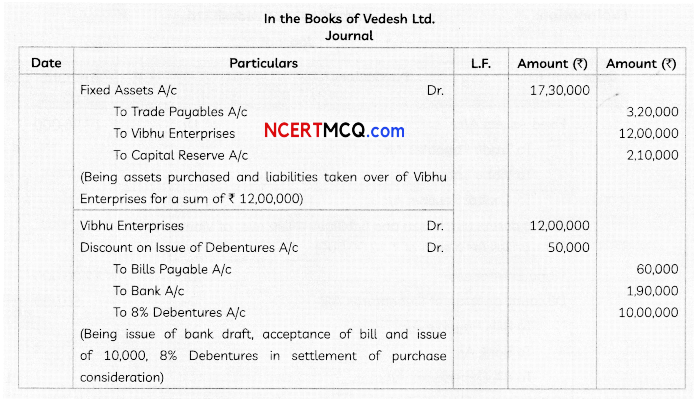
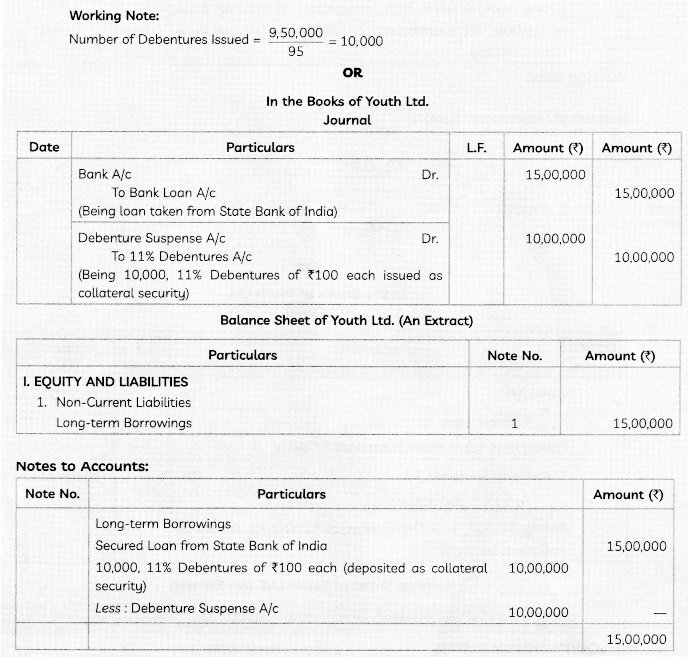
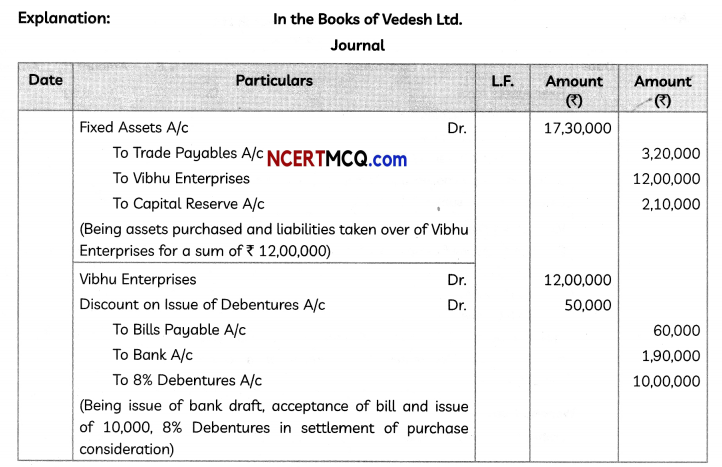
Working Note:
Number of Debentures Issued = \(\frac{\text { Amount Due }}{\text { Issue Price }} \)
= \(\frac{₹ 9,50,000}{₹(100-5)}\)
= 10,000
OR
In the Books of Youth Ltd. Journal
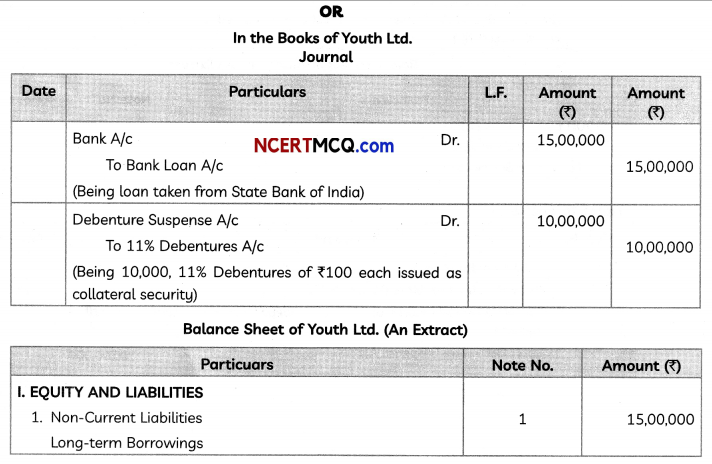

Question 7.
Madhav, Madhusudan, and Mukund were partners In Jaganath Associates. They decided to dissolve the firm on 31 March 2021. Pass necessary journaL entries for the following transactions after various assets (other than cash) and third-party liabilities have been transferred to realization account:
(i) Old machine fully written off was sold for ₹ 42,000 while a payment of ₹ 6,000 is made to bank for a bill discounted being dishonored.
(ii) Madhusudan accepted an unrecorded asset of ₹ 80,000 at ₹ 75,000 and the balance through cheque, against the payment of his Loan to the firm of ₹ 1,00,000.
(iii) Stock of book value of ₹ 30,000 was taken by Madhav, Madhusudan, and Mukund in their profit sharing ratio.
(iv) The firm had paid realization expenses amounting to ₹ 5,000 on behalf of Mukund.
(v) There was a vehicle loan of ₹ 2,00,000 which was paid by surrender of asset to the bank at an agreed value of ₹ 1,40,000 and the shortfall was met from firm’s bank account
OR
Gini, Bini, and Mini were in partnership sharing profits and Losses In the ratio of 5: 2: 2. Their
Balance Sheet as at 31 March 2021 was as follows:
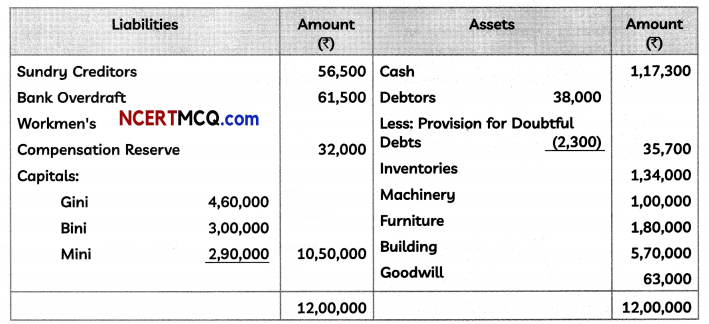
On 31st March, 2021, Gini retired from the firm. All the partners agreed to revalue the assets and liabilities on the following basis:
(i) Bad debts amounted to ₹ 5,000. A provision for doubtful debts was to be maintained at 10% on debtors.
(ii) Partners have decided to write off existing goodwill.
(iii) Goodwill of the firm was valued at ₹ 54,000 and be adjusted into the Capital Accounts of Bini and Mini, who will share profits in future in the ratio of 5: 4.
(iv) The assets and liabilities valued as: Inventories ₹ 1,30,000; Machinery ₹ 82,000; Furniture ₹ 1,9 5,000 and Building ₹ 6,00,000.
(v) Liability of ₹ 23,000 is to be created on account of Claim for Workmen Compensation.
(vi) There was an unrecorded investment in shares of ₹ 25,000. It was decided to pay off Gini by giving her unrecorded investment in full settlement of her part payment of ₹ 28,000 and remaining amount after two months.
Prepare Revaluation Account and Partners’ Capital Accounts as on 31st March 2021. (5)
Answer:
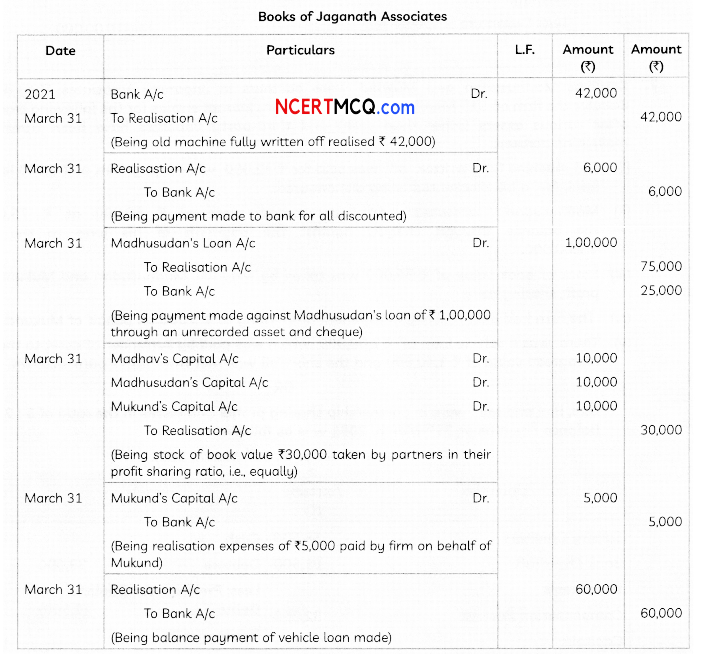
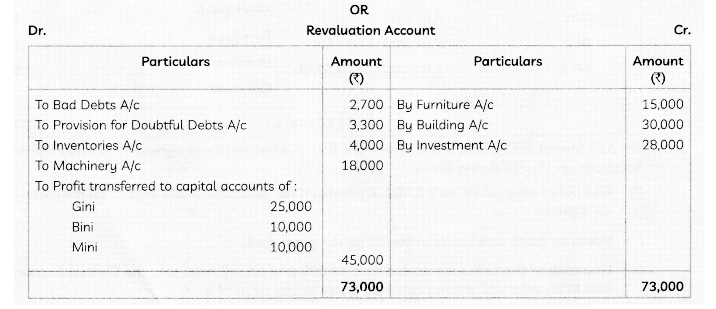
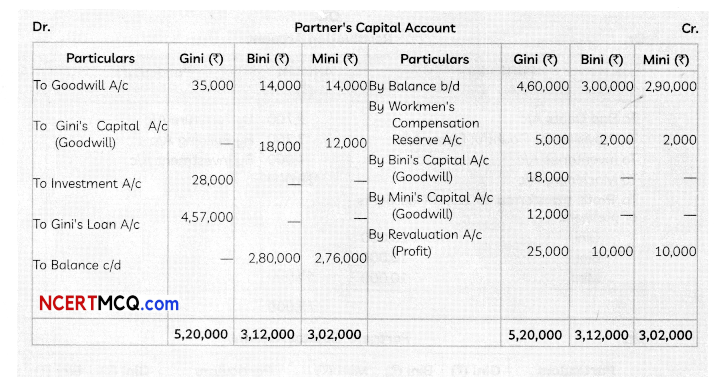
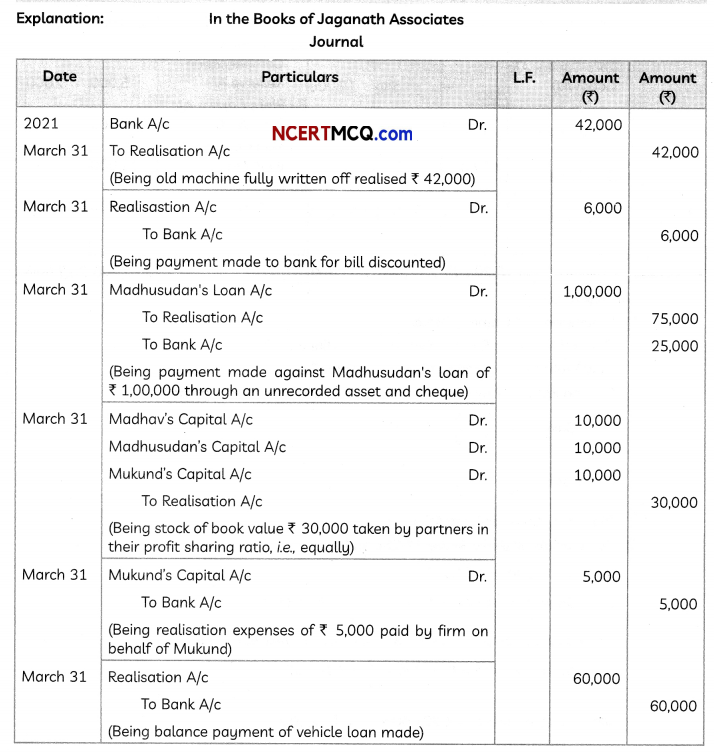
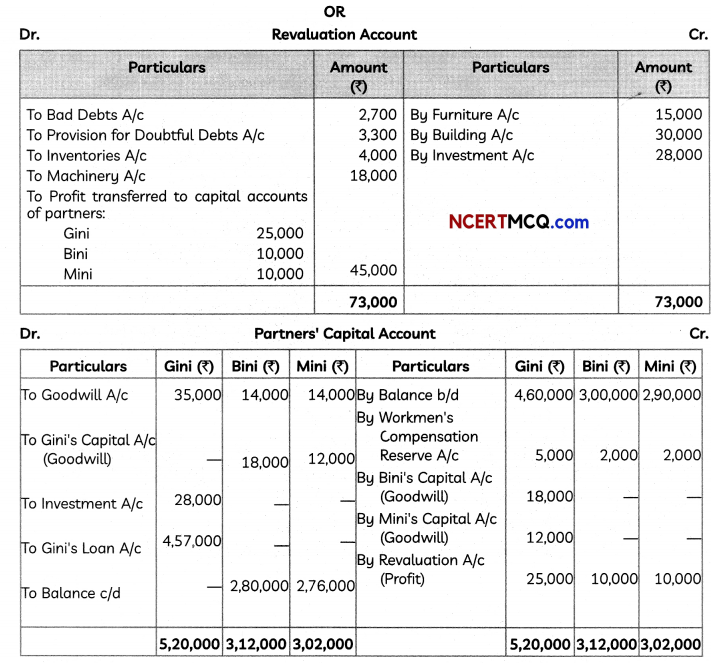
OR
Working Notes:
(1) Calculation of Gaining Ratio:
Old Profit Sharing Ratio of Gini, Bini and Mini = 5:2:2
New Profit Sharing Ratio of Bini and Mini = 5:4
Gaining Ratio = New Profit Sharing Ratio – Old Profit Sharing Ratio
Bini’s Gain = \(\frac{5}{9}-\frac{2}{9}=\frac{3}{9}\)
mini’s Gain = \(\frac{4}{9}-\frac{2}{9}=\frac{2}{9}\)
Gaining Ratio of Bini and Mini = 3:2
(2) Calculation of Gini’s Share of Goodwill:
Goodwill of Firm = ₹ 54,000
Gini’s Share of Goodwill = ₹ 54,000 x \(\frac{5}{9}\) = ₹ 30,000
which will be compensated by Bini and Mini in their gaining ratio, i.e., 3 : 2
Bini will compensate = ₹ 30,000 x \(\frac{3}{5}\) = ₹ 18,000
Mini will compensate = ₹ 30,000 x \(\frac{2}{5}\) = ₹ 12,000
(3) Adjustment of Workmen’s Compensation Reserve:
Amount of Workmen’s Compensation Reserve = ₹ 32,000
Claim for Workmen’s Compensation = ₹ 23,000
Workmen’s Compensation Reserve to be distributed among partners = ₹ 32,000 – ₹ 23,000
= ₹ 9,000.
Question 8.
Yogadatra Ltd. (pharmaceutical company) appointed marketing expert, Mr. Kartikay as the CEO of the company, with a target to penetrate their roots in the rural regions. Mr. Kartikay discussed the ways and means to achieve target of the company with financial, production and marketing departmental heads and asked the finance manager to prepare the budget.
After reviewing the suggestions given by all the departmental heads, the finance manager proposed requirement of an additional fund of ₹ 52,50,000. Yogadatra Ltd. is a zero-debt company. To avail the benefits of financial leverage, the finance manager proposed to include debt in the capital structure.
After deliberations, on April 1, 2020, the board of directors had decided to issue 6% Debentures of ₹ 100 each to the public at a premium of 5%, redeemable after 5 years at ₹110 per share.
You are required to answer the following questions:
(A) Calculate the number of debentures to be issued to raise additional funds.
(B) Pass Journal entry for the allotment of debentures.
(C) Pass Journal entry to write off loss on issue of debentures.
(D) Calculate the amount of annual fixed obligation associated with debentures.
(E) Prepare Loss on Issue of Debentures Account. (5)
Answer:
(A) Number of Debentures to be issued = \(\frac{52,50,000}{105}\) = 50,000
(B) In the Books of Yogadatra Ltd. Journal
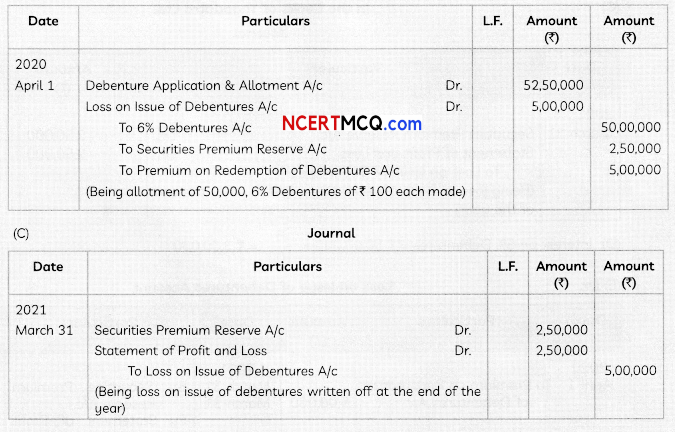
(D) Interest on 6% Debentures = ₹ 50,00,000 x \(\frac{6}{100}\) = ₹ 3,00,000

Explanation: (A) Additional Funds Raised = ₹ 52,50,000
Number of Debentures Issued to raise Additional Funds = \(\frac{\text { Additional Funds Raised }}{\text { Issue Price }} \)
= \(\frac{₹ 52,50,000}{₹(100+5)}\) = 50,000
(B) In the Books of Yogadatra Ltd.

(C) In the Books of Yogadatra Ltd.
Journal

(D) Interest on 6% Debentures = ₹ 50,00,000 x \(\frac{6}{100}\) = ₹ 3,00,000

Question 9.
From the following Receipts and Payments Account and additional information provided by Ramanath Club, Prepare Income and Expenditure Account for the year ending on 31st March 2021.
Receipts and Payments Account for the year ending 31st March 2021.
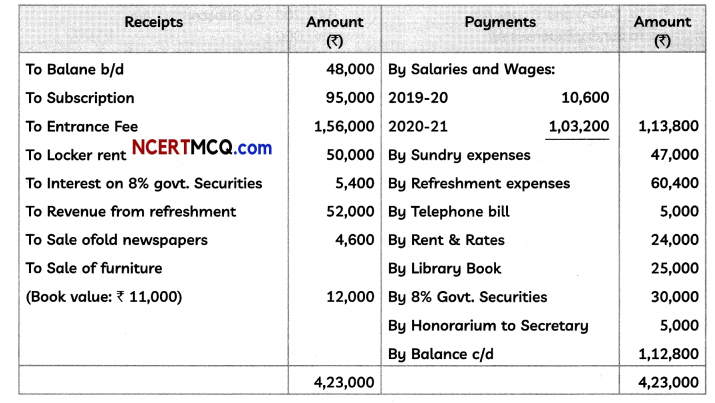
Additional Information:
(i) Subscription received during the year includes ₹ 25,000 as donation for Building.
(ii) Telephone bill unpaid as on March 31, 2020 was ₹ 4,000 and on March 31, 2021, ₹ 2,600.
(iii) Value of 8% Government Securities on March 31, 2020, was ₹ 80,000.
(iv) AdditionaL Government Securities worth ₹ 30,000 were purchased on March 31, 2021. (5)
Answer:
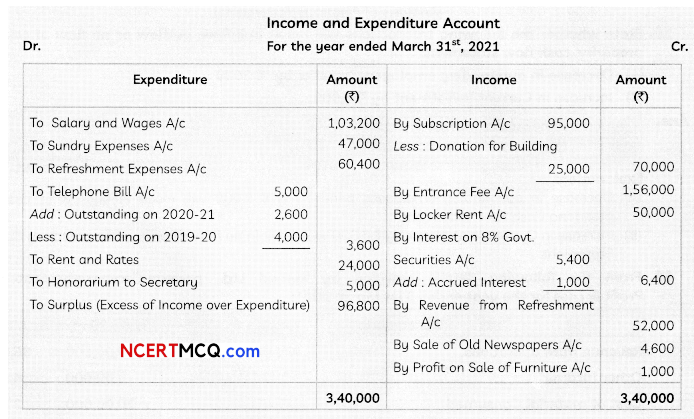
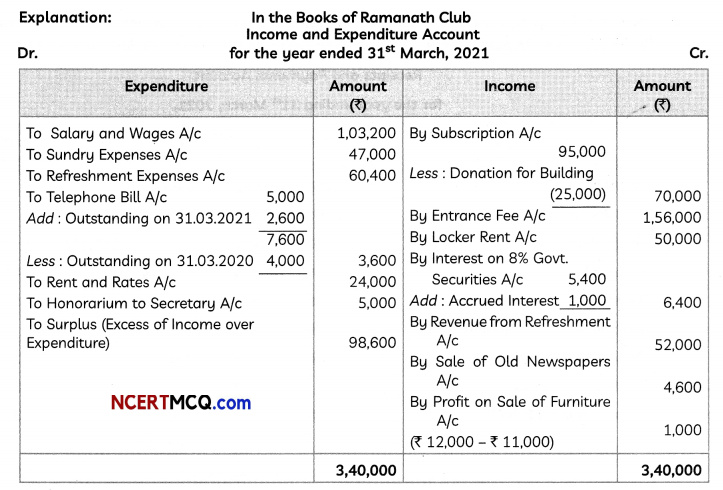
Working Note:
Interest on 8% Government Securities for year 2020-21 = ₹ 80,000 x \(\frac{8}{100}\) = ₹ 6,400
Accrued Interest on 8% Government Securities = ₹ 6,400 – ₹ 5,400 = ₹ 1,000
PART-B
Option-1
(Analysis of Financial Statements)
Question 10.
State whether the following transactions will result in inflow, outflow or no flow of cash while preparing cash flow statement:
(A) Decrease in outstanding employees benefits by ₹ 3000
(B) Increase in Current Investment by ₹ 6,000. (2)
Answer:
(A) Income and Expenditure Account
(B) No Flow. [Marking Scheme]
Explanation:
(A) Decrease in outstanding employee benefits by ₹ 3,000 will result in outflow of cash while preparing Cash Flow Statement.
(B) Increase in Current Investment by ₹ 6,000 will result in no flow of cash, while preparing Cash Flow Statement.
Question 11.
From the following details provided by Kumud Ltd., prepare a Comparative Statement of Profit & Loss for the year ended 31st March 2021:
| Particulars | 31.03.20 (₹) | 31.03.21 (₹) |
| Revenue from operations Other Income Cost of material Consumed Other Expenses Tax rate |
30,00,000 3,00,000 20,00,000 1,00,000 40% |
35,00,000 4,50,000 23,00,00 1,20,000 40% |
OR
From the following Balance Sheets of Vinayak Ltd. as at 31st March 2021, Prepare a Common” size Balance Sheet.
Vinayak Ltd.
Balance Sheet as on 31st March, 2021 (3)
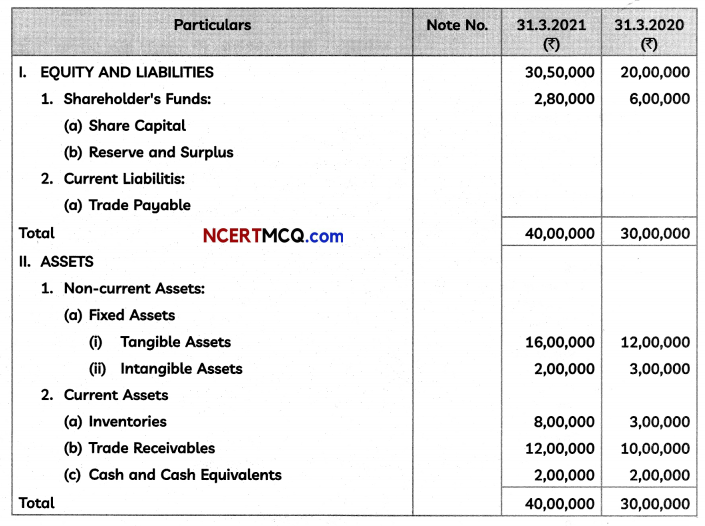
Answer:
Comparative Statement Profit and Loss For the year ended 31st March 2021
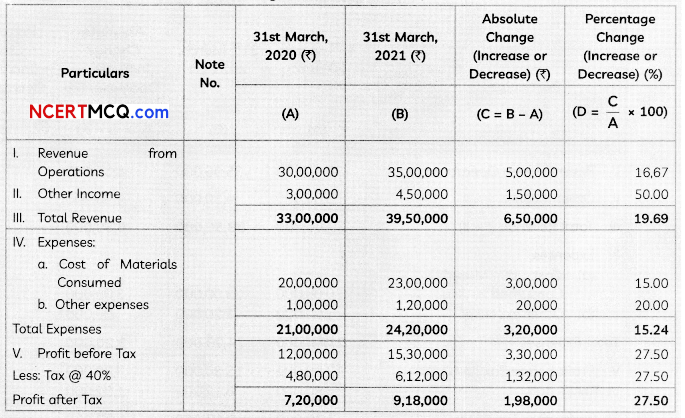
OR
Common Size Balance Sheet of Vinayak Ltd. as at 31st March 2020 and 2021
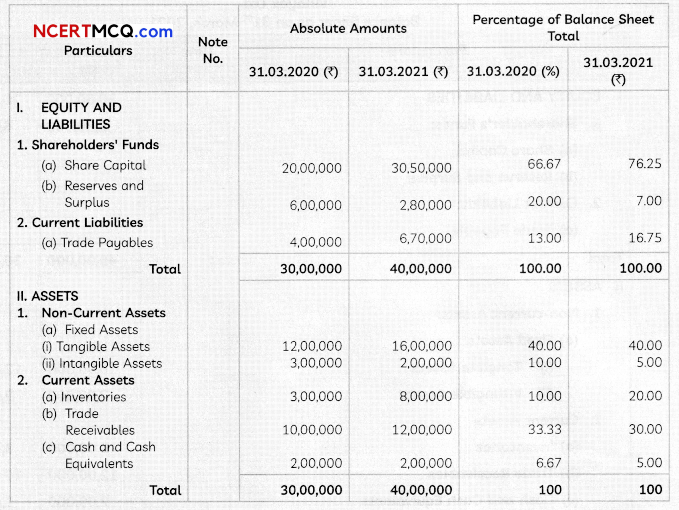
Explanation: Kumud Ltd.
Comparative Statement of Profit and Loss for the year ended 31st March, 2021
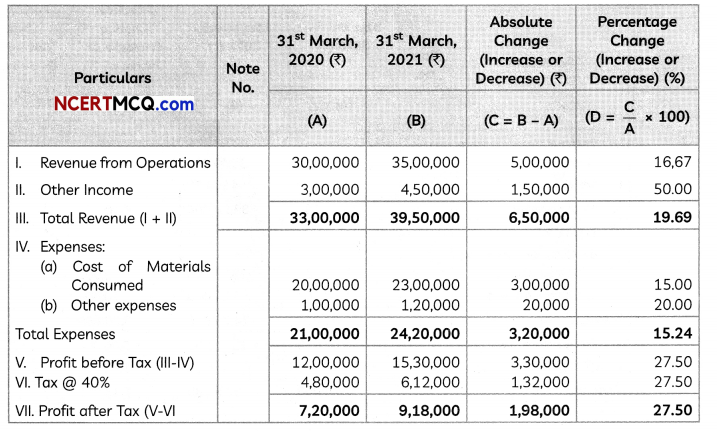
Common Size Balance Sheet of Vinayak Ltd. as at 31st March 2020 and 2021
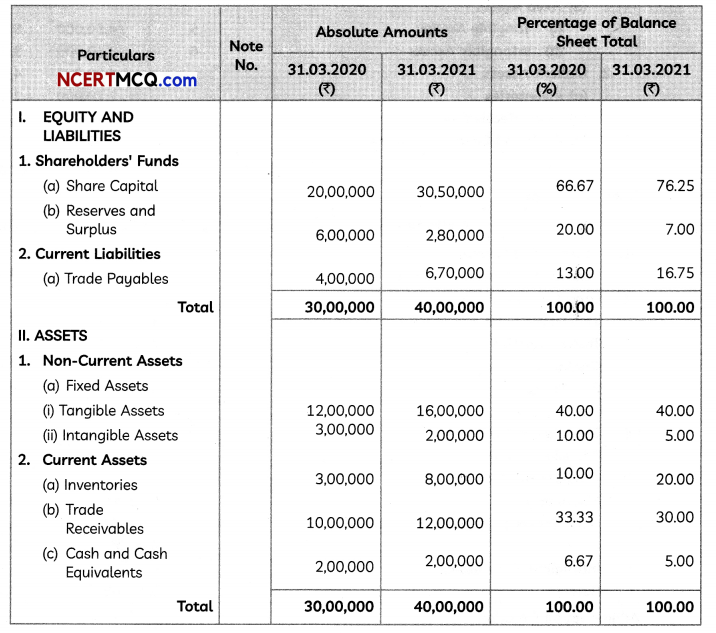
Question 12.
On the basis of information given by Aradhana Ltd., prepare Cash Flow Statement for the year ending 31st March 2021:
Aradhana Ltd.
Balance Sheet as on 31st March 2021
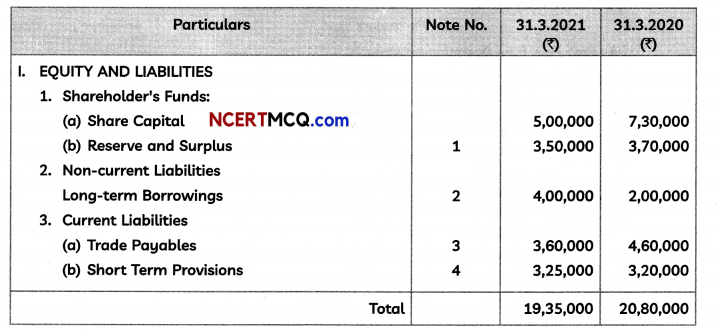
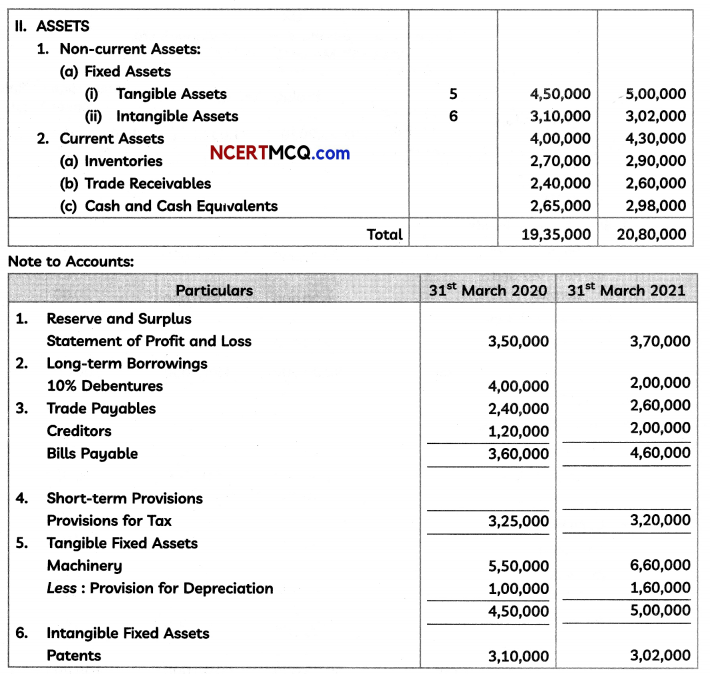
Additional Information:
(I) Debentures were redeemed on 1st April 2020.
(ii) Tax paid during the year ₹ 2,80,000 (5)
Answer:
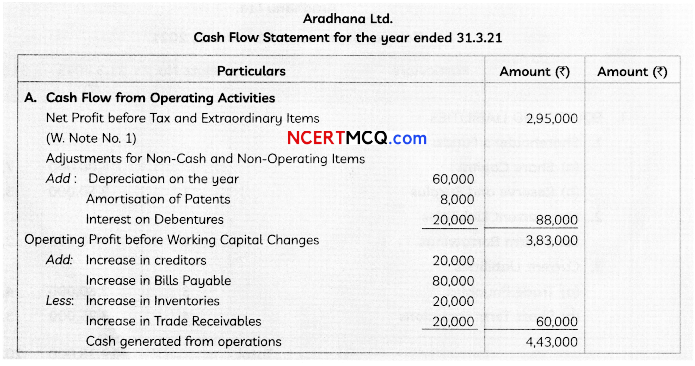
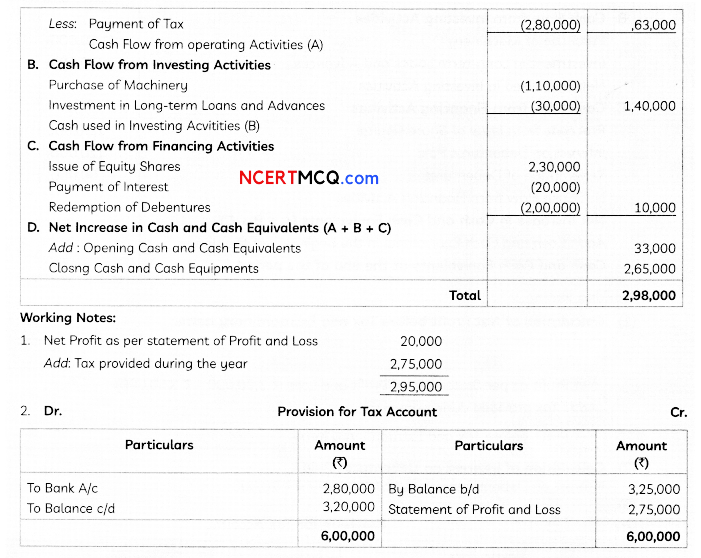
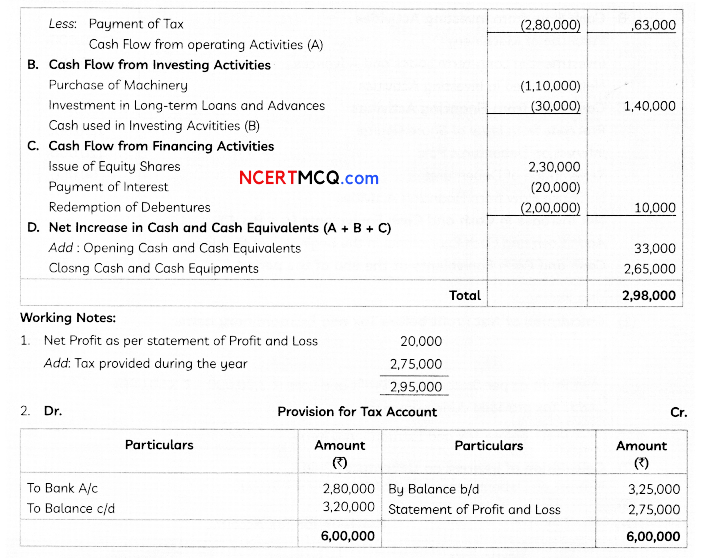
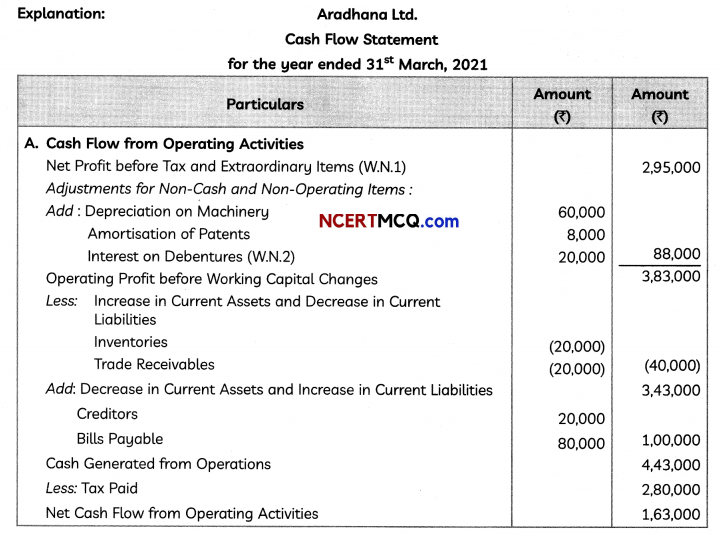
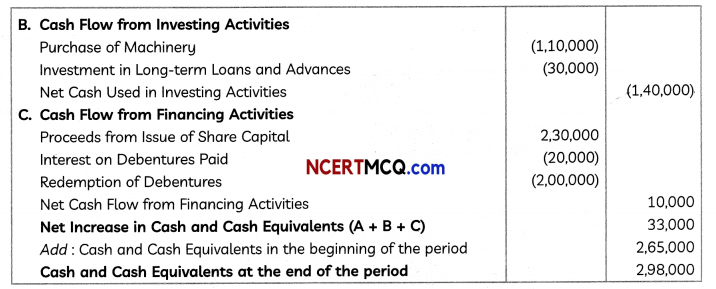
Working Notes:
(1) Calculation of Net Profit before Tax and Extraordinary Items:

(2) Calculation of Interest on Debentures Paid:
Interest on Debentures = 10% of ₹ 2,00,000 = ₹ 20,000
(3)
